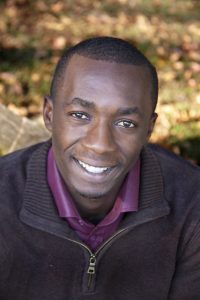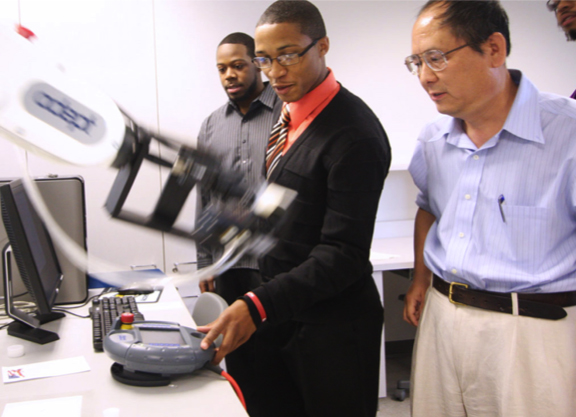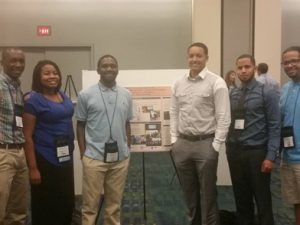At Johnson C. Smith University (JCSU) in Charlotte, N.C., Coastal Resilience Center (CRC) Principal investigator Dr. Hang Chen is working to prepare the next generation of leaders in coastal resilience.
Through her project, “Preparing Tomorrow’s Minority Task Force in Coastal Resilience through Interdisciplinary Education, Research, and Curriculum Development,” undergraduate students at JCSU – a Historically Black College and University with one of the nation’s leading computer science programs – are learning how their talents, interests and perspectives can help protect coastal communities from threats related to natural hazards and climate change.

Last fall, nine undergraduate students researched hazards risk management using an interdisciplinary approach that integrated computer science, geoscience and social science methodologies. Through the process, students explored risk assessment and analysis theory, and reviewed key actions communities can take to reduce and manage vulnerability. Students then applied this knowledge to a case study of Hurricane Matthew in which they analyzed the impact and proposed a hypothetical hurricane emergency management plan for a town of their choice.
As the CRC project progresses, JCSU students will learn more about coastal resilience through four new undergraduate courses and a seminar series that brings academic leaders and practitioners to campus. Research opportunities for undergraduate students during the academic year and summer will also continue under the direction of Chen, who also serves as College of STEM (Science, Technology, Engineering and Mathematics) interim dean and chairwoman of the computer science and engineering department.
Tailoring research to community needs

Last fall, JCSU senior Jean-Marie Nshimiyimana was part of a team that studied how different populations in Daytona Beach, Fla., reacted to Hurricane Matthew. Their research compared responses between the National Aeronautics and Space Administration’s Kennedy Space Center and the broader community, and assessed how well the local government provided information to all groups, including tourists. They also analysed how homeowners’ understanding of risk affected how seriously they took pre-event warnings.
“It was pretty interesting to see the way people responded to evacuation notices because their initial thoughts were, ‘We’re safe. We’re not going to be impacted,’” Nshimiyimana said.
Nshimiyimana said the research was an opportunity to apply skills he has learned in the computer science department.
“Most of the stereotypes that are behind being a computer science major is that you’re only going to focus on developing applications or coding or other things that are related to computer science exclusively,” he said. “The blend made it more interesting and more fascinating because not only was I able to use mapping systems, I was able to learn how to use my skills in doing deeper analysis and interpretation of data to provide a conclusion on how to better serve the community using what I know.”
For Nshimiyimana, a native of Burundi, improving hazard risk management and community resilience is personal. Flooding and landslides have ravaged the central African country during the past few years, leveling homes and injurings hundreds. A torrential rain event in 2014 killed at least 69 people and displaced nearly 20,000 people, according to the International Federation of Red Cross and Red Crescent Societies.

Nshimiyimana said he understands how a lack of financial resources can be a barrier to involving the community in risk management, and sees potential for better utilizing mapping tools to identify vulnerable land and communicate risks to urban planners and Burundi citizens.
“The research really helped me gain a better understanding of why decision-making, urban planning and other mitigation processes are really important to the safety of people within the communities,” he said.
Investigating whether certain socio-economic groups are more vulnerable to natural hazards than others has been a common interest among students engaged with the CRC project so far, Chen said.
“Many students came from economically disadvantaged communities,” she said. “Students involved in the research showed sincere interest in learning more about their community’s risk from natural hazards and vulnerabilities. They also felt empowered to make a positive impact on their communities.”
A focus on diversity
In addition to bringing fresh perspectives to the field, the CRC project aims to address the underrepresentation of minority students pursuing careers in coastal resilience.
Chen said the rise of knowledge-based economies has increased the need for an especially skilled and diverse workforce, which has precipitated a demand for minority graduates who take a multidisciplinary and customer-driven approach to STEM promoted through the Department of Homeland Security.
“Although there is no singular reason for the racial disparities within the college major choices, literature suggests that the barriers exist, which include academic under-preparedness, lack of mentorship, and negative race and gender stereotypes regarding the ability to succeed in STEM fields,” she said.

By addressing societal issues like sustainability, environmental justice, and community resilience, the project’s programs will help attract new students to the STEM discipline and offer a more holistic understanding of STEM fields that employers and graduate study programs are looking for, Chen said.
“We need to identify knowledge and skills gaps in STEM graduates and how we could give our students the experience, skills and potential to excel in graduate studies and workplaces,” she said.
Nshimiyimana, who will pursue graduate studies in computer science, said participating in research as an undergraduate student was a worthwhile opportunity to expand his understanding of the field and give back to the community.
“We all have a role to play,” he said. “I believe the students I have been working with, my peers, have demonstrated a great appreciation for why it’s important to be socially aware and what measures students can take in contributing to making communities aware of the challenges they face, if not tomorrow then in the near future.”
